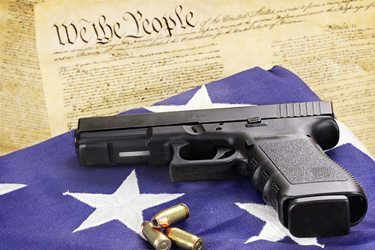Supreme Court to Consider Gun Bans for Domestic Violence Convictions
The Supreme Court announced Tuesday it would consider the scope of a federal law that prohibits individuals convicted of domestic violence from owning firearms.

On Tuesday, the Supreme Court agreed to re-enter the gun debate and consider the scope of a federal law that prohibits individuals convicted of domestic violence from owning a gun.
In 2001, James Castleman was charged in Tennessee state court with misdemeanor domestic assault. Castleman pleaded guilty and was sentenced to supervised probation for 11 months and 29 days. In 2008, law enforcement agents discovered that Castleman and his wife were buying firearms from gun dealers and selling them on the black market. In 2009, Castleman was charged with two counts of possession of a firearm by a person convicted of a misdemeanor crime of domestic violence and three counts of making false or fictitious statements to a federally licensed firearm dealer in order to purchase firearms in violation of a federal law that prohibits individuals convicted of domestic violence from owning a firearm.
Castleman moved to dismiss the indictment against him, arguing that his Tennessee domestic assault offense is not a “misdemeanor crime of domestic violence” and, therefore, not covered under the federal domestic violence ban, because it does not have an element of the use of physical force as the cause of injury. A lower court and court of appeals agreed and threw out Castleman’s indictment, reasoning that the Tennessee domestic assault statute under which Castleman pleaded guilty allows for an injury to happen from something other than the use of physical force (like ingesting poisoned liquid, for example). Because Castleman’s conviction didn’t establish violent, physical force against the victim, his conviction can’t serve as a qualifying misdemeanor under the federal domestic violence ban, the court concluded.
So the question before the Roberts Court is whether or not a misdemeanor conviction of domestic violence like Castleman’s can qualify under the federal domestic violence gun ban. According to Castleman and some appellate courts, before a domestic assault conviction can count under the federal law, it must be based on the use of actual, physical violence. Threats, coercion, and anything absent violent force does not count.
The Obama administration argues that if the Roberts Court adopts Castleman’s reasoning it would leave the federal domestic violence gun prohibition toothless. That’s because, according to the petition to the Supreme Court, domestic violence convictions entered in nearly two-thirds of the states at the time the federal prohibition was passed would be exempt, since those state laws have no requirement of actual physical force to support a domestic assault conviction. Furthermore, the administration argues, any assault that knowingly results in bodily injury necessarily has, to some degree, the use of “physical force.”
The case was one of eight the Supreme Court agreed to hear after reviewing more than 200 petitions for its September 30 conference. Oral arguments in the case have not yet been set but are expected sometime in January.
